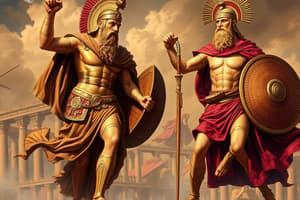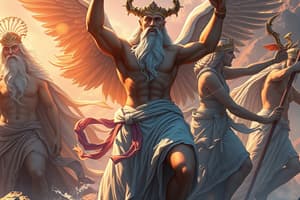Podcast
Questions and Answers
What is the contribution of Herophilus to the understanding of the cardiovascular and nervous systems?
What is the contribution of Herophilus to the understanding of the cardiovascular and nervous systems?
He separated the cardiovascular system from the nervous system by differentiating blood vessels from nerves.
Which of the following describes the Cerebral Cortex?
Which of the following describes the Cerebral Cortex?
- Body of nerve fibers
- Inner layer of the brain
- Part of the spinal cord
- Outer layer of the brain (correct)
What is the etymology of the word 'Corpus Callosum'?
What is the etymology of the word 'Corpus Callosum'?
Corpus means 'body' and Callosus means 'tough'.
What does the term 'Meningitis' refer to?
What does the term 'Meningitis' refer to?
What does 'Epilepsy' refer to?
What does 'Epilepsy' refer to?
What is the basic function of the endocrine system?
What is the basic function of the endocrine system?
What is the role of the Pituitary Gland?
What is the role of the Pituitary Gland?
What hormones does the Thyroid Gland produce?
What hormones does the Thyroid Gland produce?
What is the function of the Parathyroid Gland?
What is the function of the Parathyroid Gland?
What is the function of the Adrenal Gland?
What is the function of the Adrenal Gland?
What do the Islets of Langerhans do?
What do the Islets of Langerhans do?
What is the function of the Testes?
What is the function of the Testes?
What is the function of the Ovaries?
What is the function of the Ovaries?
What does 'cretinism' refer to?
What does 'cretinism' refer to?
What is the etymology of the word 'estrogen'?
What is the etymology of the word 'estrogen'?
What are the etymologies of the words 'nomenclature' and 'taxonomy'?
What are the etymologies of the words 'nomenclature' and 'taxonomy'?
How did the Greeks explain the existence of illnesses/diseases?
How did the Greeks explain the existence of illnesses/diseases?
What sort of cures did the Greeks try for various illnesses and wounds?
What sort of cures did the Greeks try for various illnesses and wounds?
Match the following mythological characters with their descriptions:
Match the following mythological characters with their descriptions:
Who was Hippocrates and what was his influence on medicine?
Who was Hippocrates and what was his influence on medicine?
Why did Greek and Latin languages influence medical terminology?
Why did Greek and Latin languages influence medical terminology?
How did the geography of the ancient Mediterranean influence disease spread?
How did the geography of the ancient Mediterranean influence disease spread?
Why might degenerative diseases and cancers have been less common in the ancient Mediterranean?
Why might degenerative diseases and cancers have been less common in the ancient Mediterranean?
Why were plagues of interest in ancient times?
Why were plagues of interest in ancient times?
Name at least 2 modern ailments that existed in ancient times.
Name at least 2 modern ailments that existed in ancient times.
What is an 'inflected' language, and how are Latin and Greek examples?
What is an 'inflected' language, and how are Latin and Greek examples?
What medical information can be gleaned from Homer's Iliad?
What medical information can be gleaned from Homer's Iliad?
Why were early doctors also philosophers?
Why were early doctors also philosophers?
What is 'anatomy'?
What is 'anatomy'?
What were some contributions of Aristotle to biological science?
What were some contributions of Aristotle to biological science?
Why did Greek scientists avoid human dissection before the Hellenistic period?
Why did Greek scientists avoid human dissection before the Hellenistic period?
Why was Hellenistic Alexandria more open to scientific experimentation?
Why was Hellenistic Alexandria more open to scientific experimentation?
What were some advances made by Hellenistic Greek anatomists?
What were some advances made by Hellenistic Greek anatomists?
Explain the difference between a noun and an adjective.
Explain the difference between a noun and an adjective.
What is 'trephining'?
What is 'trephining'?
What is a 'palindrome'?
What is a 'palindrome'?
How did Greek medical practices influence Roman practices?
How did Greek medical practices influence Roman practices?
What were some early types of antiseptic?
What were some early types of antiseptic?
What is meant by 'inflection' and 'declension'?
What is meant by 'inflection' and 'declension'?
Describe the Greek god Asclepius.
Describe the Greek god Asclepius.
What was the process of 'temple incubation' in ancient Greece?
What was the process of 'temple incubation' in ancient Greece?
What is the symbol for the American Medical Association?
What is the symbol for the American Medical Association?
What is meant by 'verb conjugation'?
What is meant by 'verb conjugation'?
What is a 'participle'?
What is a 'participle'?
Describe the cardiovascular theory of Aristotle.
Describe the cardiovascular theory of Aristotle.
What were two of Galen's theories about the cardiovascular system?
What were two of Galen's theories about the cardiovascular system?
What is pneuma?
What is pneuma?
How do respiration, inspiration, and expiration function in the respiratory system?
How do respiration, inspiration, and expiration function in the respiratory system?
Explain the etymology of pneumonia.
Explain the etymology of pneumonia.
What is the basic function of the digestive system?
What is the basic function of the digestive system?
What is metabolism?
What is metabolism?
Describe one Hippocratic theory about digestion.
Describe one Hippocratic theory about digestion.
What was Erasistratus's theory about digestion?
What was Erasistratus's theory about digestion?
What was the main theory of vision in antiquity?
What was the main theory of vision in antiquity?
Why did the ancients believe in the extramission theory?
Why did the ancients believe in the extramission theory?
Who were key figures disseminating the extramission theory?
Who were key figures disseminating the extramission theory?
When and where did the intromission theory emerge?
When and where did the intromission theory emerge?
What is the main function of the hematopoietic system?
What is the main function of the hematopoietic system?
What is a main function of the lymphatic system?
What is a main function of the lymphatic system?
Why were the ancient Greeks and Romans limited in understanding the hematopoietic and lymphatic systems?
Why were the ancient Greeks and Romans limited in understanding the hematopoietic and lymphatic systems?
What are the etymologies of the words 'muscle' and 'skeleton'?
What are the etymologies of the words 'muscle' and 'skeleton'?
What are main functions of the musculoskeletal system?
What are main functions of the musculoskeletal system?
What is the musculoskeletal system composed of?
What is the musculoskeletal system composed of?
Describe the characteristics of the three muscle types.
Describe the characteristics of the three muscle types.
Explain two of the ways muscles are named.
Explain two of the ways muscles are named.
Give examples of bones named after everyday objects.
Give examples of bones named after everyday objects.
What is the etymology of the word 'nerve'?
What is the etymology of the word 'nerve'?
What are the main functions of the nervous system?
What are the main functions of the nervous system?
What are the three main parts of the nervous system?
What are the three main parts of the nervous system?
What is the difference between the CNS and PNS?
What is the difference between the CNS and PNS?
Which ancient Greek anatomist proved the existence of a separate nervous system?
Which ancient Greek anatomist proved the existence of a separate nervous system?
Flashcards are hidden until you start studying
Study Notes
Ancient Greek Medicine and Mythology
- Illnesses were explained via mythology, such as Pandora releasing ills from her jar.
- Seizures, called "the sacred disease," were perceived as divine messages.
- Gods like Apollo could inflict plagues; these beliefs inspired rational medical thought.
Greek Cures and Healing Practices
- Cures included prayer and offerings to Asclepius, the god of healing.
- Use of herbal remedies, scalpels, and surgical techniques were prevalent.
- Hygeia, daughter of Asclepius, symbolized hygiene and cleanliness.
Key Mythological Characters
- Pandora: First woman who unleashed suffering into the world.
- Apollo: God of healing and plague, brother to Artemis.
- Asclepius: God of healing, son of Apollo.
- Hygeia: Goddess of cleanliness, associated with health.
Hippocrates and Rational Medicine
- Lived in the 5th century BCE, advocated observation and rationality in medicine.
- Emphasized diagnosis through empirical evidence rather than divine explanations.
Influence of Language on Medical Terminology
- Greek and Latin became scholarly languages due to invasions and cultural exchanges.
- These languages facilitated the creation of specialized medical terms.
Geography's Role in Disease Spread
- Ancient Mediterranean's smaller, isolated communities limited contact and disease spread.
Diet and Lifestyle Impacts on Health
- Active lifestyles and natural diets contributed to lower incidences of degenerative diseases and cancers.
- Modern processed foods and sedentary habits are linked to increased health issues.
Interest in Plagues
- Ancient societies reported plagues to avoid infected areas; ongoing interest exists for tracking diseases today.
Historical Ailments
- Common ailments such as colds and venereal diseases existed in ancient times.
Inflected Languages
- Inflected languages like Latin and Greek change word endings to convey grammatical roles.
- Examples in English include differentiating between "I" and "me."
Medical Insights from Homer's Iliad
- Descriptions of battle injuries reflect practical treatment methods based on available resources.
Philosophers as Early Medical Practitioners
- Early physicians were often philosophers, contemplating body functions and health maintenance.
Anatomy
- "Anatomy" originates from Greek terms meaning to cut up; it refers to studying body structures.
Dissection and Taboos
- Dissection was taboo before the 3rd century due to beliefs about corpse handling; it became accepted later in Alexandria.
Hellenistic Advances in Anatomy
- Herophilus and Erasistratus made significant contributions, including human dissection and the understanding of the nervous and circulatory systems.
Trephining
- An ancient surgical practice involving drilling holes in the skull, possibly to release evil spirits.
Palindromes
- Words that read the same forwards and backwards, exemplified by "racecar."
Greek Influence on Roman Medicine
- Greek medical advancements, including surgical tools and treatment methods, were adopted by Romans.
Antiseptic Practices
- Early antiseptics included wine and vinegar; ancient surgical instruments like scalpels and trepans laid foundations for modern practices.
Linguistic Terms
- Declension refers to varying endings of nouns, while inflection involves verb endings.
Asclepius and Healing
- Asclepius, associated with healing, had children like Hygeia; temple incubation involved dream interpretations for treatment.
Symbol of Medicine
- The American Medical Association's symbol is a snake entwined around a staff, representing healing and medicine.
Verb Conjugation
- Conjugation alters verb endings based on subject; examples include "I break" vs. "he breaks."
Participles
- Participles function as both adjectives and verbs; examples include "traveling" in different contexts.
Ancient Cardiovascular Theories
- Aristotle viewed the heart as central to physiology; other physicians explored blood vessel functions and origins.
Galen's Cardiovascular Theories
- Galen theorized the liver as the source of veins; he differentiated between arterial and venous blood's functions.
Concept of Pneuma
- Pneuma, or life-sustaining air, was believed to flow through arteries while veins carried blood.
Respiratory System Terminology
- Inspiration is inhalation; expiration is exhalation, and respiration encompasses both processes.
Etymology of Diseases
- Pertussis (whooping cough) and pneumonia (lung condition) derived from descriptive Greek roots.
Digestive System Function
- The digestive system's primary role is breaking down food for nutrient absorption, guided by the etymology of "digest."
Metabolism and Its Types
- Metabolism encompasses nutrient transformation; anabolism builds up substances, while catabolism breaks them down.
Hippocratic Digestion Theory
- Good digestion was linked to a balance of humors; poor diet could produce disease instigating vapors.
Alternative Digestive Theories
- Erasistratus believed digestion was caused by friction in the stomach walls.
Vision Theories
- The extramission theory posited that the eyes emit light for vision, an incorrect concept sustained for centuries due to observational biases.
Key Proponents of Vision Theory
- Philosophers like Plato and Galen supported the extramission theory before it was replaced by intromission theory, credited to Ibn al-Haytham.
Functions of Hematopoietic System
- The hematopoietic system is responsible for producing blood cells.
Lymphatic System Functions
- The lymphatic system plays a crucial role in immunity and pathogen defense.
Limitations in Ancient Medical Knowledge
- The Greeks lacked microscopes, hindering their understanding of the hematopoietic and lymphatic systems.
Etymology of "Muscle" and "Skeleton"
- "Muscle" stems from "mouse"; "skeleton" originates from meaning "dried up body."
Functions of Musculoskeletal System
- Primary roles include body support, motion facilitation, and organ protection.
Composition of Musculoskeletal System
- Composed of muscles, bones, connective tissues, ligaments, cartilage, tendons, and joints.
Characteristics of Muscle Types
- Smooth muscle is non-striated; cardiac muscle features interconnected striated fibers; skeletal muscle has striated fibers.
Naming Conventions of Muscles
- Muscles are named for physical characteristics or based on body parts they control.
Bones Named After Objects
- Example bones include patella (little dish) and clavicle (little key).
Etymology of "Nerve"
- "Nerve" originates from the term for "tendon" or "sinew."
Functions of the Nervous System
- The nervous system transmits signals and reacts to stimuli from the environment and body.
Structure of the Nervous System
- Comprises three main components: brain, spinal cord, and nerves.
CNS vs. PNS
- The Central Nervous System (CNS) includes the brain and spinal cord, while the Peripheral Nervous System (PNS) covers the entire body’s nerves.
Contribution of Herophilus
- Herophilus distinguished the nervous system from the cardiovascular system in the late 4th century BCE, aiding anatomical understanding.
Brain Parts Etymology
- Cerebral cortex translates to "outer layer of the brain"; corpus callosum means "tough body," connecting brain hemispheres.
Nervous System Diseases
- Meningitis involves inflammation of protective membranes; epilepsy refers to seizures originating from above.
Endocrine System Function and Etymology
- The endocrine system regulates hormones; "endocrine" means to separate or judge from within.
Key Endocrine Glands
- Pituitary gland: Regulates growth and hormones; considered the most influential gland.
- Thyroid gland: Manages metabolism, body heat, and bone growth.
- Parathyroid gland: Regulates blood calcium levels.
- Adrenal glands: Help the body respond to stress.
- Islets of Langerhans: Control pancreatic hormone production.
Male and Female Gonads
- Testes: Produce testosterone; define male characteristics.
- Ovaries: Generate ova and female hormones.
Cretinism vs. Crine
- Cretinism denotes severe iron deficiency; "crine" is derived from Latin meaning "to separate."
Studying That Suits You
Use AI to generate personalized quizzes and flashcards to suit your learning preferences.




